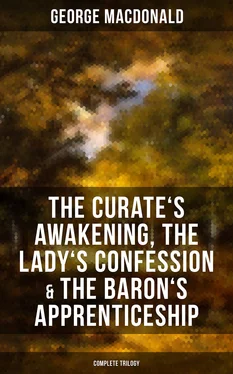By the time he reached his lodging, the glow had vanished, but the mood remained. He sat down and wrote the first sketch of the following verses, then found that his sermon had again drawn nigh, and was within the reach of his spiritual tentacles.
Father, I cry to thee for bread,
With hungered longing, eager prayer;
Thou hear'st, and givest me instead
More hunger and a half-despair.
O Lord, how long? My days decline;
My youth is lapped in memories old;
I need not bread alone, but wine—
See, cup and hand to thee I hold.
And yet thou givest: thanks, O Lord,
That still my heart with hunger faints!
The day will come when at thy board
I sit forgetting all my plaints.
If rain must come and winds must blow,
And I pore long o'er dim-seen chart,
Yet, Lord, let not the hunger go,
And keep the faintness at my heart.
CHAPTER XXXIV.
A SERMON TO LEOPOLD.
Table of Contents
When the curate stood up to read, his eyes as of themselves sought Mrs. Ramshorn's pew. There sat Helen, with a look that revealed, he thought, more of determination and less of suffering. Her aunt was by her side, cold and glaring, an ecclesiastical puss, ready to spring upon any small church-mouse that dared squeak in its own murine way. Bascombe was not visible, and that was a relief. For an unbelieving face, whether the dull dining countenance of a mayor, or the keen searching countenance of a barrister, is a sad bone in the throat of utterance, and has to be of set will passed over, and, if that may be, forgotten. Wingfold tried hard to forget Mrs. Ramshorn's, and one or two besides, and by the time he came to the sermon, thought of nothing but human hearts, their agonies, and him who came to call them to him.
"I came not to call the righteous, but sinners to repentance."
"Was it then of the sinners first our Lord thought ere he came from the bosom of the Father? Did the perfect will embrace in the all-atoning tenderness of the divine heart, the degraded, disfigured, defiled, distorted thing, whose angel is too blind ever to see the face of its Father? Through all the hideous filth of the charnel-house, which the passions had heaped upon her, did the Word recognise the bound, wing-lamed, feather-draggled Psyche, panting in horriblest torture? Did he have a desire to the work of his hands, the child of his father's heart, and therefore, strong in compassion, speed to the painful rescue of hearts like his own? That purity arid defilement should thus meet across all the great dividing gulf of law and morals! The friend of publicans and sinners! Think: he was absolutely friendly with them! was not shocked at them! held up no hands of dismay! Only they must do so no more.
"If he were to come again, visibly, now, which do you think would come crowding around him in greater numbers—the respectable church-goers, or the people from the slums? I do not know. I dare not judge. But the fact that the church draws so few of those that are despised, of those whom Jesus drew and to whom most expressly he came, gives ground for question as to how far the church is like her Lord. Certainly many a one would find the way to the feet of the master, from whom the respectable church-goer, the pharisee of our time, and the priest who stands on his profession, would draw back with disgust. And doubtless it would be in the religious world that a man like Jesus, who, without a professional education, a craftsman by birth and early training, uttered scarce a phrase endorsed by clerical use, or a word of the religious cant of the day, but taught in simplest natural forms the eternal facts of faith and hope and love, would meet with the chief and perhaps the only BITTER opponents of his doctrine and life.
"But did our Lord not call the righteous? Did he not call honest men about him—James and John and Simon—sturdy fisher-folk, who faced the night and the storm, worked hard, fared roughly, lived honestly, and led good cleanly lives with father and mother, or with wife and children? I do not know that he said anything special to convince them that they were sinners before he called them. But it is to be remarked that one of the first effects of his company upon Simon Peter was, that the fisherman grew ashamed of himself, and while ashamed was yet possessed with an impulse of openness and honesty no less than passionate. The pure man should not be deceived as to what sort of company he was in! 'Depart from me, for I am a sinful man, O Lord!' I would I could clearly behold with my mind's eye what he then saw in Jesus that drew from him that cry! fle knew him for the Messiah: what was the working of the carpenter upon the fisherman that satisfied him of the fact? Would the miracle have done it but for the previous talk from the boat to the people? I think not. Anyhow St. Peter judged himself among the sinners, and we may be sure that if these fishers had been self-satisfied men, they would not have left all and gone after him who called them. Still it would hardly seem that it was specially as sinners that he did so. Again, did not men such as the Lord himself regarded as righteous come to him—Nicodemus, Nathaniel, the young man who came running and kneeled to him, the scribe who was not far from the kingdom, the centurion, in whom he found more faith than in any Jew, he who had built a synagogue in Capernaum, and sculptured on its lintel the pot of manna? These came to him, and we know he was ready to receive them. But he knew such would always come drawn of the Father; they did not want much calling; they were not so much in his thoughts therefore; he was not troubled about them; they were as the ninety and nine, the elder son at home, the money in the purse. Doubtless they had much to learn, were not yet in the kingdom, but they were crowding about its door. If I set it forth aright, I know not, but thus it looks to me. And one thing I cannot forget—it meets me in the face—that some at least,—who knows if not all?—of the purest of men have counted themselves the greatest sinners! Neither can I forget that other saying of our Lord, a stumbling-block to many—our Lord was not so careful as perhaps some would have had him, lest men should stumble at the truth—The first shall be last and the last first. While our Lord spoke the words: The time cometh that whosoever killeth you will think that he doeth God service, even then was Saul of Tarsus at the feet of Gamaliel, preparing to do God that service; but like one born out of due time, after all the rest he saw the Lord, and became the chief in labour and suffering. Thus the last became first. And I bethink me that the beloved disciple, who leaned on the bosom of the Lord, who was bolder to ask him than any—with the boldness of love, he whom the meek and lowly called a Son of Thunder, was the last of all to rejoin the master in the mansions of his Father. Last or first—if only we are with him! One thing is clear that in the order of the Lord's business, first came sinners.
"Who that reflects can fail to see this at least, that a crime brings a man face to face with the reality of things? He who knows himself a sinner—I do not mean as one of the race—the most self-righteous man will allow that as a man he is a sinner—he to whom, in the words of the communion service, the remembrance of his sins is grievous, and the burden of them intolerable, knows in himself that he is a lost man. He can no more hold up his head among his kind; he cannot look a woman or a child in the face; he cannot be left alone with the chaos of his thoughts, and the monsters it momently breeds. The joys of his childhood, the delights of existence, are gone from him. There dwells within him an ever present judgment and fiery indignation. Such a man will start at the sound of pardon and peace, even as the camel of the desert at the scent of water. Therefore surely is such a man nearer to the gate of the kingdom than he against whom the world has never wagged a tongue, who never sinned against a social custom even, and has as easy a conscience as the day he was born; but who knows so little of himself that, while he thinks he is good enough, he carries within him the capacity and possibility of every cardinal sin, waiting only the special and fitting temptation which, like the match to the charged mine, shall set all in a roar! Of this danger he knows nothing, never dreams of praying against it, takes his seat in his pew Sunday after Sunday with his family, nor ever murmurs Lead us not into temptation with the least sense that temptation is a frightful thing, but repeats and responds and listens in perfect self-satisfaction, doubting never that a world made up of such as he must be a pleasant sight in the eyes of the Perfect. There are men who will never see what they are capable or in danger of until they have committed some fearful wrong. Nay there are some for whom even that is not enough; they must be found out by their fellow-men, and scorned in the eyes of the world, before they can or will admit or comprehend their own disgrace. And there are worse still than these.
Читать дальше












